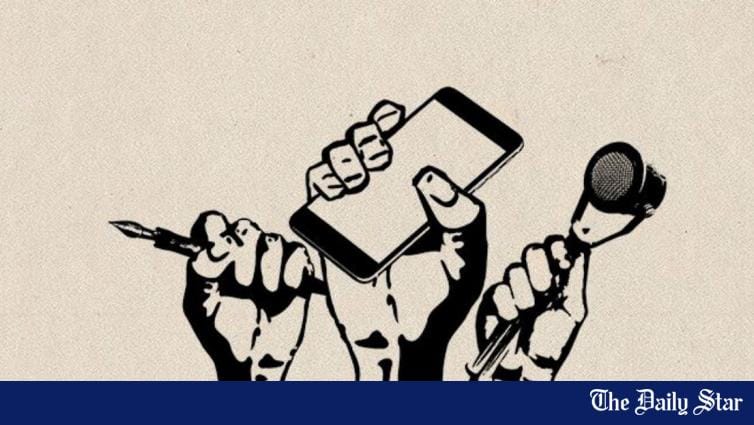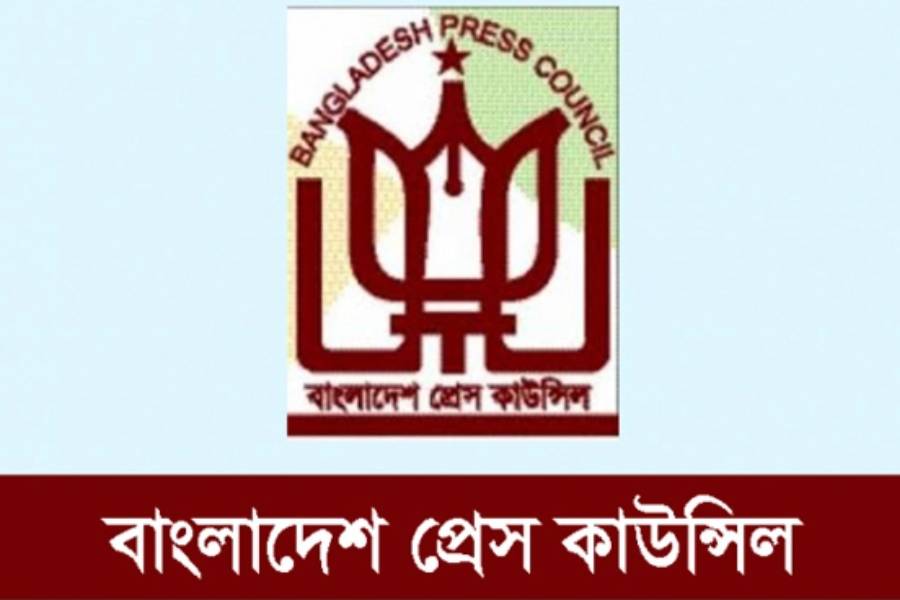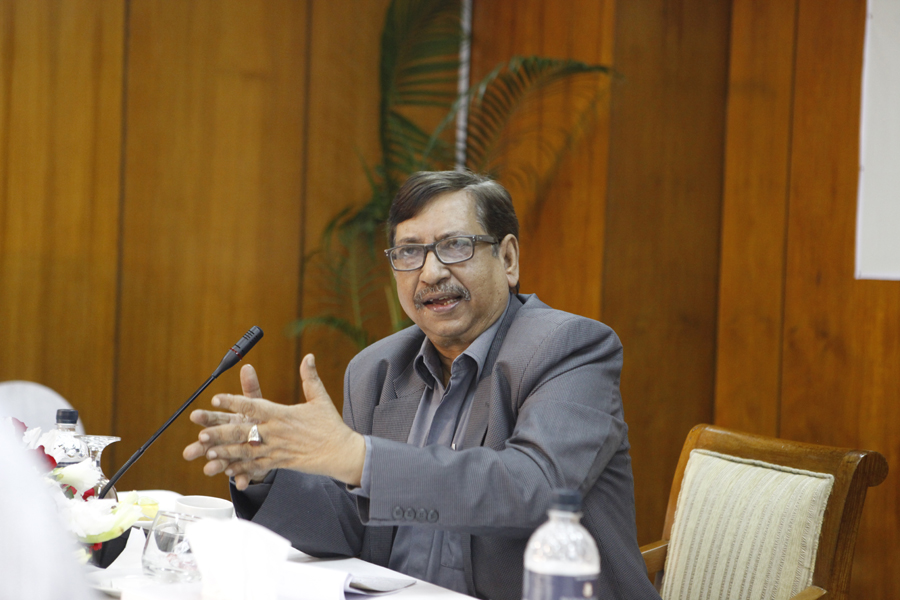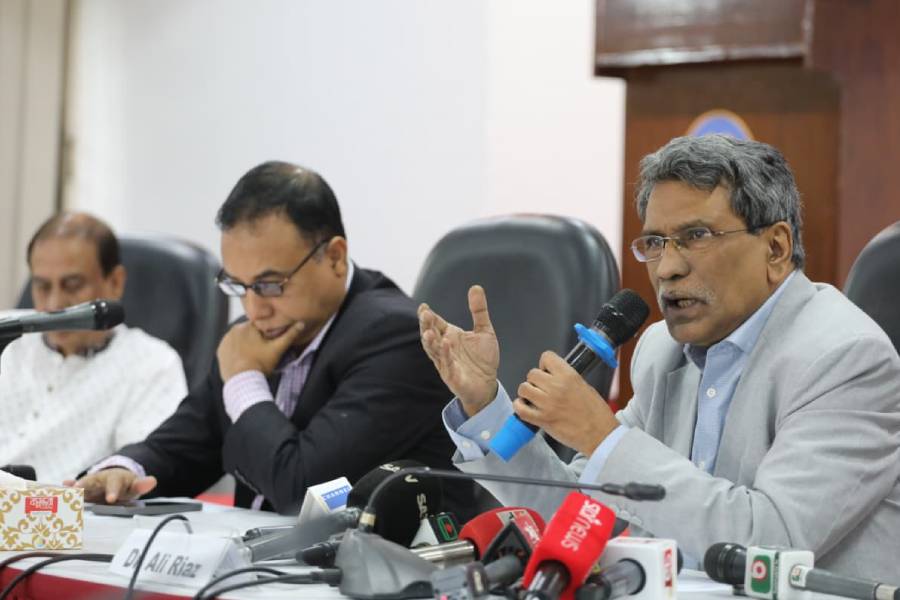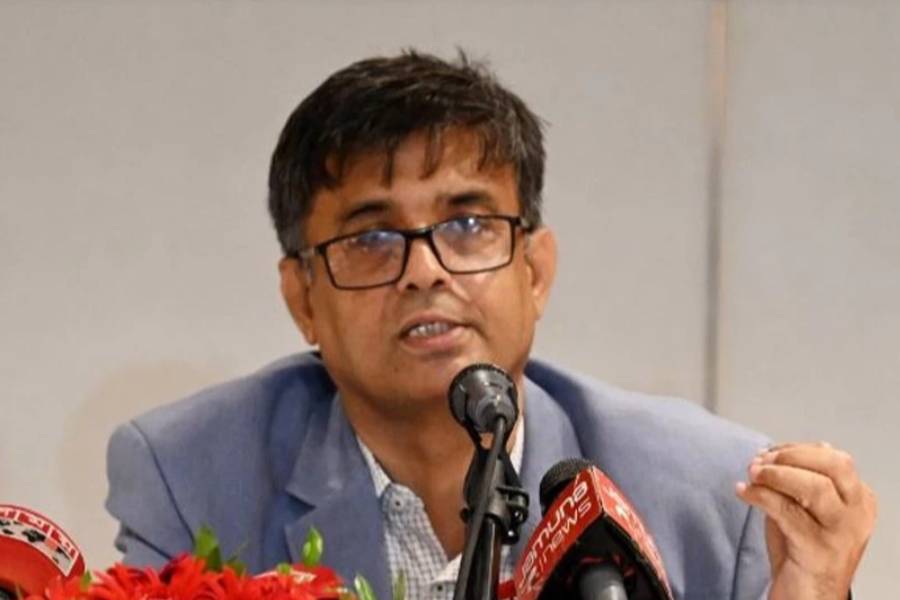Date of Event:
Nov 13, 2024
External forces must not interfere with the media

Dr Iftekharuzzaman, executive director of Transparency International Bangladesh (TIB), talks about the current state of press freedom in the country, recent attempts by certain groups to suppress some media outlets, and the potential way out of the situation with Naznin Tithi of The Daily Star.
Why is the media still unable to operate freely following the political change in the country, despite repeated commitments from the interim government to ensure press freedom?
Let's remember the background of the anti-discrimination movement, which initially began as a quota reform movement seeking justice in public sector recruitment. The underlying factors behind this movement, however, were multi-dimensional and deeply rooted in institutionalised discrimination across all aspects of life and society, shaped by years of authoritarian rule. The student-led movement was soon joined by the broader public, rallying under the main slogan against all forms of discrimination. On August 5, the authoritarian regime fell. But this does not necessarily mean that we have achieved a discrimination-free Bangladesh, nor can we expect the deep-rooted discriminatory structures and practices to be transformed in the short term.
The people's dream for a "new Bangladesh" includes restructuring the state and establishing a new social and political order, with a clear stance against all forms of discrimination. While the government, the movement itself, and other stakeholders are clearly committed to realising this vision, what we are observing post-August 5 is that various groups, considering themselves victors—whether as direct participants, supporters, or opportunists—do not all share the same understanding or vision of a discrimination-free society. This divergence is now manifesting in different ways.
What reforms does the media need in Bangladesh?
The diversity of our society—in terms of gender, religion, culture, ethnicity, etc—is under severe stress as some groups feel newly entitled to impose parochial agendas. Using labels like "collaborators" or "co-opted beneficiaries" of the previous authoritarian regime, these forces now consider themselves empowered—sometimes excessively so—to impose their own agendas, which are not necessarily aligned with the anti-discrimination movement's spirit.
The media has become one of the targets of these groups, which are now trying to impose their own interpretations of media freedom onto others. Certain sections of the media that have played a very supportive role in the whole movement, advocated for a diverse and inclusive society, and have been consistent with the anti-discriminatory spirit are now being selectively targeted. Media freedom is being subjected to campaigns by forces whose basic conceptualisation, indoctrination, and ways of imposing agendas are discriminatory at their core, which is deeply troubling.
Nevertheless, we cannot ignore the factors that contributed to the transformation of an originally democratically elected regime in 2008 into a draconian authoritarian one. It was designed to monopolise political and governance space and to capture state and non-state institutions to create a superstructure perceived to maintain power indefinitely, without accountability. This setup enabled abuse of power, corruption, and the criminalisation of politics with impunity. It is also a fact that the media was among the institutions targeted for capture and control. As a result, some segments of the media struggled to navigate state-sponsored controls and conspiracies while striving for independence and professionalism, though often at the cost of reluctant self-censorship. On the other hand, many media outlets allowed themselves to be co-opted, benefiting from and even becoming components of the authoritarian superstructure. While no one should condone such collaborators or facilitators of the previous regime, indiscriminately victimising the entire media or launching targeted attacks on select outlets for what occurred under authoritarian rule is unacceptable.
How would you explain the recent attempts by certain groups to silence the media or the mob mentality directed against journalists and specific media outlets? What role has the government played in stopping this?
The interim government has repeatedly stated its commitment to a free press. When the chief adviser met with newspaper editors, he encouraged them to be critical and objective in identifying the government's failures. From the government's side, we have not seen anything detrimental to media freedom, except for the recent indiscriminate cancellation of accreditation of a large number of journalists.
When agitations took place against some of the leading media houses, the government provided them support and resisted such moves. However, certain groups who find themselves to be over-empowered—who may or may not have participated in the movement—continue to act as if it is their time to impose their own agenda to target media that is not in their liking for their own reason. While the government has successfully prevented worse outcomes, there is no guarantee that these forces have been fully controlled or managed to the extent that such indoctrinated groups won't strike back. So, the government must be vigilant to safeguard media freedom. History is replete with examples that failure to ensure free media can only be self-defeating.
Mob justice is the manifestation or a weapon these forces are using. And the media has obviously become one of the targets. However, this is not the first time that it has been used. Mob justice has taken place in other contexts as well since August 5. This is also not unusual in the context of such a huge popular uprising against a deep-rooted authoritarian regime. Many people would consider it normal because people have deep-rooted sentiments against the former regime. People have strong emotions against those who are in any manner considered to be associated with or part of the authoritarian regime and those who facilitated the ruthless killings, tortures, all kinds of discrimination and violation of fundamental rights. Mob justice is the outburst of that emotion of people against such grievances. But there is a limit to it and the government must strategically address and manage it in due process through effective communication.
Incidentally, the two most prominent media houses in the country, which are under attack now, were directly victimised in the worst possible way by the authoritarian regime. They were blacklisted from any government programmes or press conferences and deprived of government advertisements. It is no secret that they were consistent targets of manipulation, harassment, and intimidation by the intelligence agencies, the main powerbase of the previous regime. Both houses had to endure a series of politically motivated cases due to their role as free media. Their fate symbolised the criminalisation of free media driven by a hunger for power. Despite this, they survived the challenging situation without compromising their commitment to upholding the spirit of a free press. Whether they are targeted in the "new Bangladesh" because of their alleged "linkage" with India or the previous regime, or for upholding the spirit of a free press, is anyone's guess.

VISUAL: ANWAR SOHEL
The interim government has announced plans to repeal the Cyber Security Act (CSA). How do you view this development?
It was the right decision and an expected one. There was widespread demand for this from the public, and the civil society and the media played a role in advocating for its repeal. Here, I would like to mention a number of things that should be done. The government should immediately undertake a comprehensive programme of duly compensating the victims of this draconian law and their families and rehabilitate them professionally, psychologically, and socially. Secondly, they should withdraw all the ongoing cases, although there is a legal issue in that. But if the government is willing, there can be ways of addressing the issue. Thirdly, in the present global context, there is no other option but to have a Cyber Security Act. But while drafting the new cyber security law, they should be able to take the right lessons from the DSA and the CSA. It has to be drafted through a fully participatory process, involving all stakeholders, including experts and professionals on cyber security. Plus, whoever is drafting this law must remember that it is not meant to control or dictate terms of freedom of expression or media freedom on cyber platforms—the Internet system, social media, and other digital platforms. The purpose of this law should be restricted to ensuring the safety and security of users on the Internet and the digital sphere. But any form of control of free expression, dissent, free speech, or free media should be outside the new law's scope.
Also, the names such as the Cyber Security Act or the Digital Security Act should not be used anymore. These names have created an atmosphere of intimidation, a sense of insecurity in society. The new law can be called something like the Internet Safety Act. Finally, since the government is the largest user and worst possible abuser of the Internet and digital system as per track record, to avoid conflict of interest, the authority to be created to oversee the implementation of this new law must be an independent body outside the control of the government.
The government has established a media reform commission. What types of media reforms are needed in this changed political climate and how can the media in Bangladesh regain public trust?
First of all, media as a fourth estate must be committed to upholding the fundamental principles of media ethics and integrity. The media as an institution cannot and does not need to be controlled by external forces. But in Bangladesh, we have seen that the media has been subjected to government control motivated by partisan political bias or influence for which draconian laws and state institutions including intelligence agencies were used. One of the tools used against media was divide and rule and cooption. As a result, while a few media houses may have their own integrity and ethical standards and practices, there has always been a lack of efforts on part of the media as a sector to develop and uphold the basic principles of independent and ethical journalism, or professional integrity among media personnel. I think now the media houses should try to sit together in the spirit of a new Bangladesh. They should themselves create a media code of ethics, ethics structures and implementation roadmaps. There must be mechanisms for the media to self-regulate and work transparently and accountably, maintaining professional integrity without external influence, political or otherwise. There has to be some serious system of sectoral oversight rather than anything coming from outside.
Secondly, like anywhere else in the world, media houses here are also essentially business entities. That's part of the reality. Nevertheless, there are good global practices. The capacity of the investors to differentiate between business interests and media freedom is very important. To instil this ideal into the media houses, their investors and media leaders, relevant professionals and experts should come together to make their own policies. However, no matter how much we talk about media reforms, unless and until there is a paradigm shift in the culture and practices of our politics and bureaucracy, which remain hostage to a media control mindset, changes will not happen.
Thirdly, media organisations must ensure that journalists and reporters are properly compensated and protected, with adequate job security and safety from all risks associated with the discharge of their professional duties. Many journalists are underpaid or irregularly paid, which must change for the media to maintain integrity.
Media, unlike most other institutions, have to be accountable to its constituency—the readers and viewers—every day, and in fact, every moment. Therefore, to survive credibly it must develop its own inbuilt system of ethics and integrity. No freedom is unlimited or unaccountable, but in the case of media, the limit to freedom and the process of accountability must be defined and ensured by the media itself within its constitutional mandate.
Dr Iftekharuzzaman, executive director of Transparency International Bangladesh (TIB), talks about the current state of press freedom in the country, recent attempts by certain groups to suppress some media outlets, and the potential way out of the situation with Naznin Tithi of The Daily Star.
Why is the media still unable to operate freely following the political change in the country, despite repeated commitments from the interim government to ensure press freedom?
Let's remember the background of the anti-discrimination movement, which initially began as a quota reform movement seeking justice in public sector recruitment. The underlying factors behind this movement, however, were multi-dimensional and deeply rooted in institutionalised discrimination across all aspects of life and society, shaped by years of authoritarian rule. The student-led movement was soon joined by the broader public, rallying under the main slogan against all forms of discrimination. On August 5, the authoritarian regime fell. But this does not necessarily mean that we have achieved a discrimination-free Bangladesh, nor can we expect the deep-rooted discriminatory structures and practices to be transformed in the short term.
The people's dream for a "new Bangladesh" includes restructuring the state and establishing a new social and political order, with a clear stance against all forms of discrimination. While the government, the movement itself, and other stakeholders are clearly committed to realising this vision, what we are observing post-August 5 is that various groups, considering themselves victors—whether as direct participants, supporters, or opportunists—do not all share the same understanding or vision of a discrimination-free society. This divergence is now manifesting in different ways.
What reforms does the media need in Bangladesh?
The diversity of our society—in terms of gender, religion, culture, ethnicity, etc—is under severe stress as some groups feel newly entitled to impose parochial agendas. Using labels like "collaborators" or "co-opted beneficiaries" of the previous authoritarian regime, these forces now consider themselves empowered—sometimes excessively so—to impose their own agendas, which are not necessarily aligned with the anti-discrimination movement's spirit.
The media has become one of the targets of these groups, which are now trying to impose their own interpretations of media freedom onto others. Certain sections of the media that have played a very supportive role in the whole movement, advocated for a diverse and inclusive society, and have been consistent with the anti-discriminatory spirit are now being selectively targeted. Media freedom is being subjected to campaigns by forces whose basic conceptualisation, indoctrination, and ways of imposing agendas are discriminatory at their core, which is deeply troubling.
Nevertheless, we cannot ignore the factors that contributed to the transformation of an originally democratically elected regime in 2008 into a draconian authoritarian one. It was designed to monopolise political and governance space and to capture state and non-state institutions to create a superstructure perceived to maintain power indefinitely, without accountability. This setup enabled abuse of power, corruption, and the criminalisation of politics with impunity. It is also a fact that the media was among the institutions targeted for capture and control. As a result, some segments of the media struggled to navigate state-sponsored controls and conspiracies while striving for independence and professionalism, though often at the cost of reluctant self-censorship. On the other hand, many media outlets allowed themselves to be co-opted, benefiting from and even becoming components of the authoritarian superstructure. While no one should condone such collaborators or facilitators of the previous regime, indiscriminately victimising the entire media or launching targeted attacks on select outlets for what occurred under authoritarian rule is unacceptable.
How would you explain the recent attempts by certain groups to silence the media or the mob mentality directed against journalists and specific media outlets? What role has the government played in stopping this?
The interim government has repeatedly stated its commitment to a free press. When the chief adviser met with newspaper editors, he encouraged them to be critical and objective in identifying the government's failures. From the government's side, we have not seen anything detrimental to media freedom, except for the recent indiscriminate cancellation of accreditation of a large number of journalists.
When agitations took place against some of the leading media houses, the government provided them support and resisted such moves. However, certain groups who find themselves to be over-empowered—who may or may not have participated in the movement—continue to act as if it is their time to impose their own agenda to target media that is not in their liking for their own reason. While the government has successfully prevented worse outcomes, there is no guarantee that these forces have been fully controlled or managed to the extent that such indoctrinated groups won't strike back. So, the government must be vigilant to safeguard media freedom. History is replete with examples that failure to ensure free media can only be self-defeating.
Mob justice is the manifestation or a weapon these forces are using. And the media has obviously become one of the targets. However, this is not the first time that it has been used. Mob justice has taken place in other contexts as well since August 5. This is also not unusual in the context of such a huge popular uprising against a deep-rooted authoritarian regime. Many people would consider it normal because people have deep-rooted sentiments against the former regime. People have strong emotions against those who are in any manner considered to be associated with or part of the authoritarian regime and those who facilitated the ruthless killings, tortures, all kinds of discrimination and violation of fundamental rights. Mob justice is the outburst of that emotion of people against such grievances. But there is a limit to it and the government must strategically address and manage it in due process through effective communication.
Incidentally, the two most prominent media houses in the country, which are under attack now, were directly victimised in the worst possible way by the authoritarian regime. They were blacklisted from any government programmes or press conferences and deprived of government advertisements. It is no secret that they were consistent targets of manipulation, harassment, and intimidation by the intelligence agencies, the main powerbase of the previous regime. Both houses had to endure a series of politically motivated cases due to their role as free media. Their fate symbolised the criminalisation of free media driven by a hunger for power. Despite this, they survived the challenging situation without compromising their commitment to upholding the spirit of a free press. Whether they are targeted in the "new Bangladesh" because of their alleged "linkage" with India or the previous regime, or for upholding the spirit of a free press, is anyone's guess.
VISUAL: ANWAR SOHEL
The interim government has announced plans to repeal the Cyber Security Act (CSA). How do you view this development?
It was the right decision and an expected one. There was widespread demand for this from the public, and the civil society and the media played a role in advocating for its repeal. Here, I would like to mention a number of things that should be done. The government should immediately undertake a comprehensive programme of duly compensating the victims of this draconian law and their families and rehabilitate them professionally, psychologically, and socially. Secondly, they should withdraw all the ongoing cases, although there is a legal issue in that. But if the government is willing, there can be ways of addressing the issue. Thirdly, in the present global context, there is no other option but to have a Cyber Security Act. But while drafting the new cyber security law, they should be able to take the right lessons from the DSA and the CSA. It has to be drafted through a fully participatory process, involving all stakeholders, including experts and professionals on cyber security. Plus, whoever is drafting this law must remember that it is not meant to control or dictate terms of freedom of expression or media freedom on cyber platforms—the Internet system, social media, and other digital platforms. The purpose of this law should be restricted to ensuring the safety and security of users on the Internet and the digital sphere. But any form of control of free expression, dissent, free speech, or free media should be outside the new law's scope.
Also, the names such as the Cyber Security Act or the Digital Security Act should not be used anymore. These names have created an atmosphere of intimidation, a sense of insecurity in society. The new law can be called something like the Internet Safety Act. Finally, since the government is the largest user and worst possible abuser of the Internet and digital system as per track record, to avoid conflict of interest, the authority to be created to oversee the implementation of this new law must be an independent body outside the control of the government.
The government has established a media reform commission. What types of media reforms are needed in this changed political climate and how can the media in Bangladesh regain public trust?
First of all, media as a fourth estate must be committed to upholding the fundamental principles of media ethics and integrity. The media as an institution cannot and does not need to be controlled by external forces. But in Bangladesh, we have seen that the media has been subjected to government control motivated by partisan political bias or influence for which draconian laws and state institutions including intelligence agencies were used. One of the tools used against media was divide and rule and cooption. As a result, while a few media houses may have their own integrity and ethical standards and practices, there has always been a lack of efforts on part of the media as a sector to develop and uphold the basic principles of independent and ethical journalism, or professional integrity among media personnel. I think now the media houses should try to sit together in the spirit of a new Bangladesh. They should themselves create a media code of ethics, ethics structures and implementation roadmaps. There must be mechanisms for the media to self-regulate and work transparently and accountably, maintaining professional integrity without external influence, political or otherwise. There has to be some serious system of sectoral oversight rather than anything coming from outside.
Secondly, like anywhere else in the world, media houses here are also essentially business entities. That's part of the reality. Nevertheless, there are good global practices. The capacity of the investors to differentiate between business interests and media freedom is very important. To instil this ideal into the media houses, their investors and media leaders, relevant professionals and experts should come together to make their own policies. However, no matter how much we talk about media reforms, unless and until there is a paradigm shift in the culture and practices of our politics and bureaucracy, which remain hostage to a media control mindset, changes will not happen.
Thirdly, media organisations must ensure that journalists and reporters are properly compensated and protected, with adequate job security and safety from all risks associated with the discharge of their professional duties. Many journalists are underpaid or irregularly paid, which must change for the media to maintain integrity.
Media, unlike most other institutions, have to be accountable to its constituency—the readers and viewers—every day, and in fact, every moment. Therefore, to survive credibly it must develop its own inbuilt system of ethics and integrity. No freedom is unlimited or unaccountable, but in the case of media, the limit to freedom and the process of accountability must be defined and ensured by the media itself within its constitutional mandate.



